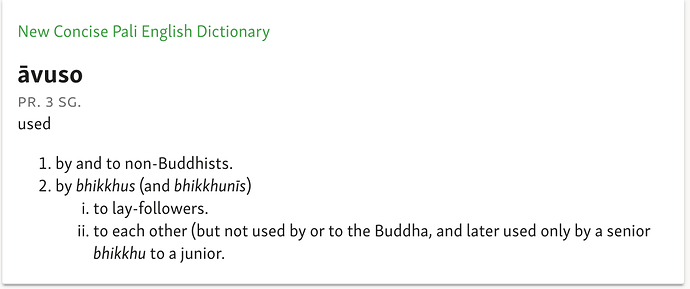After my higher ordination in Sri Lanka, in 2003, I returned to the Carolinas (USA), and soon began to interact with another Western bhikkhuni (in California), and then another (in Germany) - forging the first connections among fully-ordained Theravada Western bhikkhunis. We three discovered a weird conundrum: what to call each other?
The Buddha had instructed to call the senior Bhante (Revered Sir) and the junior Āvuso (Friend) - both male words. The Buddha’s intention in his Bhante/Āvuso instruction apparently was to instill awareness and respect for seniority within the Sangha. (He made that intention more clear by adding for seniors the option of using no honorific at all towards juniors, using just their name informally, as in, “Hello, Sudhammā, are you there?”, without giving juniors the same option.) So we wanted to respect the Buddha’s instructions.
The word Bhante was too well known as a term of address only for male bhikkus. (Later research, by the way, has shown ancient uses of Bhante for bhikkhunis.) Our elder advisors said the senior bhikkhuni should instead be addressed as “Ayye”. It’s an abbreviation for “Ariya” or Enlightened/Worthy One, but was used causally, more like “Reverend”, in the scriptures; it could apply to male or female, but was used commonly among bhikkhunis. I resisted the word at first, as in Sri Lankan culture it means something awkward.  But Ven. Bhikkhu Bodhi answered my inquiry with a letter affirming “Ayye” as the correct term for us, so I reluctantly capitulated.
But Ven. Bhikkhu Bodhi answered my inquiry with a letter affirming “Ayye” as the correct term for us, so I reluctantly capitulated.
We also needed a word to address the junior bhikkhuni. For a few years or so we simply feminized Āvuso to Āvusā, but our advisors objected, saying it’s not a legitimate use of Āvuso which is inherently male. Then we were stumped.
Nothing in the scriptures offered us guidance for a mode of address to a junior; all the bhikkhuni conversations in scripture probably occurred before the Buddha advised bhikkhus to speak hierarchically after his passing. Bhikkhunis were quoted only calling each other “Ayye” equally, just as the bhikkhus had once called each other “Āvuso”. For example, “Ayye, are you okay?” Yes, Ayye, I’m okay, are you okay?"
(My Sri Lankan bhikkhuni role models used their own language, words too unfamiliar and complex for us - something like Meheniṃwahansa for a senior, for example - so they couldn’t help us.)
Using the word for Sister, Bhaginī, for a junior was suggested by our advisors, and it does appear in scriptures as a way bhikkhus addressed bhikkhunis, so we adopted it. That word Bhaginī turned out incredibly clumsy for us to enunciate, and ugly-sounding to be called. (The aspirated h after b sounds like you’re coughing at the person.) We gave it a good try for several years or so, but everyone cringed, every time. It felt punitive.
The hierarchical intention in itself caused worse controversy - it’s just not acceptable among women as among men. I suspect this has to do with women’s low esteem of women in general. In faith I wanted to follow the Buddha’s advice to impose a linguistic hierarchy, thinking it’d be good for lowering individual ego while raising respect for the female group as a whole.
Others didn’t see it this way. Some who had arrived as highly educated, accomplished older women chafed at being addressed by a lesser status term; it seemed to hurt their pride. Younger women tended to view any hint of non-egalitarianism as outrageously unacceptable on principle. The ugly awkward word put the resistance over the top; no more saying Ayye/Bhaginī.
We finally settled on addressing each other, regardless of years in robes, with an egalitarian shared “Ayye”. And we adopted “Ayya” as an honorific for our names, as in Ayya Sudhamma, to match Bhante for monks, as in Bhante Gunaratana.
Or at least those of us among the early batches of Western bhikkhunis did. Some Western bhikkhunis coming along years later have shrugged off their elders’ decision in this matter, eschewing “Ayye” and “Ayya”, calling each other “Venerable” instead.
[Edit - typo]

 But Ven. Bhikkhu Bodhi answered my inquiry with a letter affirming “Ayye” as the correct term for us, so I reluctantly capitulated.
But Ven. Bhikkhu Bodhi answered my inquiry with a letter affirming “Ayye” as the correct term for us, so I reluctantly capitulated.
